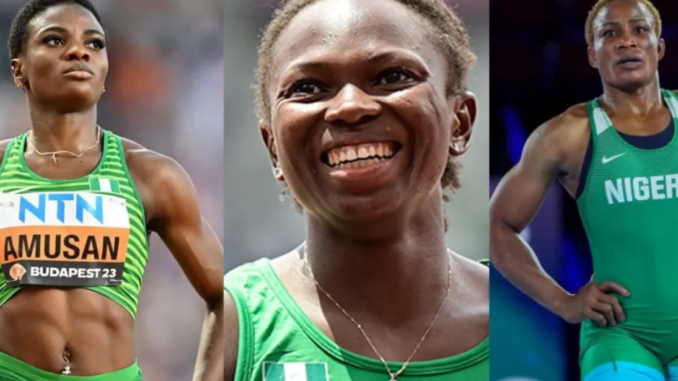
Nigeria’s contingent of 358 athletes recorded inspiring victories at the just concluded 13th African Games in Ghana. The Nigerian women especially put up unforgettable performances – like Omolara Ogunmakinju’s dramatic relay win and the wrestling team’s complete sweep of the gold medals. Overall, these athletes continued a pattern of Nigerian female athletes outperforming their male counterparts in international tournaments.
The statistics tell the story:
Although less than half of Nigeria’s contingent were women, 35 of the 47 gold medals won by the Nigerian contingent were won by women.
Nigerian women athletes’ 71 total medals won represent 58.67 per cent of the country’s total haul at the games.
This trend was also observed in the Olympics and Commonwealth Games.
Omolara Ogunmakinju, who turned silver into gold in the 4x400m mixed relay event, and the Nigerian women’s dominance on the wrestling mats exemplified how they fared at the Games.
The six women wrestlers registered for the Games – Odunayo Adekuoroye, Blessing Oborududu, Mercy Genesis, Hannah Reuben, Tolulope Ogunsanya, and Esther Kolawole – all won gold medals. Nigeria’s queen of the tracks, Oluwatobiloba Amusan, who won a third consecutive Games gold, also confirmed her status as a world-class athlete.
The Rise of Women’s Sports in Nigeria
This has not always been the case. Male boxer Nojim Maiyegun won Nigeria’s first Olympic Games medal at the 1964 Tokyo Games. The first medal won by Nigerian women was at the 1992 Barcelona Games, where the quartet of Mary Onyali, Beatrice Utondu, Faith Idehen, and Christy Opara-Thompson won bronze in the women’s 4×100 metre relay. However, a woman, Chioma Ajunwa, won Nigeria’s first individual gold when she leapt to 7.12 metres at the 1996 Games in Los Angeles.
From the 2000 Olympic Games, the female athletes took off. Of the 13 medals Nigeria has won in the Olympics, women won seven. Two of the six medals won by their male colleagues came in football (2008 and 2016).
The comparison is starker at the Commonwealth Games. Nigeria has won 149 medals since the 2002 edition, and in those six editions, the women have won 88 medals. This does not paint a picture of total dominance until one observes the gold medal section. The women have won 35 of the 48 gold medals hauled in by Team Nigeria. At the last edition in Birmingham, England, the women won all 11 gold medals that Nigeria had.
At the 2024 African Games in weightlifting, Nigeria won six gold medals. Five of these were by women – Jacinta Umunnakwe (81kg), Blessing Oraekwe (70kg), Cynthia Ogunsemilore (60kg), Patricia Mbata (75kg), and Joy Nene Ojo (57kg).
Why the Dominance? Experts weigh in
PREMIUM TIMES asked some prominent sports journalists why Nigerian women are doing better than men in sports at international competitions. There are some of the factors they cited:
Resilience: Some, like sportscaster Cecilia Omorogbe, cite women’s perseverance despite unequal conditions.
Responsibility: Others point to the societal burdens shouldered by male athletes.
Early Advantage: Nigeria’s pioneering status in some women’s sports may contribute to its ongoing advantage in international events.
Latifat Ohiosumuan, a sports content producer, said there was no surprise in this.
“As far as I know, this has always been the norm. And it isn’t just at the African Games alone. At African Championships, Commonwealth Games, and the Olympics too, in literally all sports in Nigeria, the women have been known to win more medals than their male counterparts.”
Cecilia Omorogbe, a Channels TV sports news anchor, said Nigerian female athletes work three times as hard as their male counterparts. She said what we are seeing are just the results. “It cannot be a better welfare package or more attention being paid,” Ms Omorogbe said. “I am sure if the officials were to pick the members of Team Nigeria, many of the female athletes we are hailing right now wouldn’t be picked.”
But Charles Ogundiya of the New Telegraph has a different view. “I think the responsibility of men, particularly in a place like Nigeria, plays a major part. Most of these male athletes you see have a lot they are going through as breadwinners, first sons, husbands, and the like. They give their best, but it may not be as commensurate as their female counterparts, who often have less baggage they are dealing with.”
“I will say resilience,” Ms Omorogbe stressed, citing the case of the Falcons, Nigeria’s senior women’s football national team, who are still forced to confront the inadequate conditions of the bumpy MKO Abiola Stadium in Abuja. In contrast, the U-20 men’s national team voiced their dissatisfaction and were subsequently relocated to the better Samuel Ogbemudia Stadium in Benin.
Mr Ogundiya also mentioned the first-user phenomenon, which many women events enjoy, compared to the men. “Another thing to note is that the gap between Nigeria and other countries in male sports is slim when compared to the women.
“Look at football, for example. Nigeria (women) is one of the first African countries to start playing the game, so they have an edge. But you cannot say the same with men’s football. There are many sports like that where Nigeria is an early starter in the female category, and so, it gives the female athletes an edge that men don’t get because they are mostly on par or even behind the other countries,” Mr Ogundiya added.
The Future
The 13th African Games highlighted the strength and promise of Nigerian women in sports. Addressing the inequalities that women athletes face could unlock even greater potential on the international stage.
With the Super Falcons beating the Bayana Bayana of South Africa to one of the two African slots for women in football, Nigeria will be represented in both football and basketball women’s events at the 2024 Olympic Games in Paris. The men failed to qualify for both competitions.
END

Be the first to comment